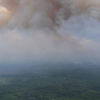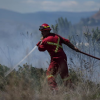The BC SPCA is urging the public to remove bird feeders from their property as the province battles the spread of a deadly strain of bird flu.
Bird baths should also be emptied, the charity said.
The warning comes a day after the Canadian Food Inspection Agency announced more cases of the H5N1 avian influenza in British Columbia.
Two flocks – one in Kelowna and one in Richmond – were found to be affected, bringing the total number of BC flocks affected up to four.
They are thought to have caught the virus from wild birds.

The Province said wild birds have tested positive for the flu in Vanderhoof, Lac la Hache, Bowen Island, Delta and Vancouver.
BC SPCA said waterfowl (ducks, geese) and raptors (hawks, eagles, owls) are at the highest risk from bird flu.
The virus can survive for several months, the charity said, and can be spread through faeces and saliva.
“Bird feeders can be sites for disease spread because they encourage unnatural congregations of birds and attract other wildlife,” said Dr. Andrea Wallace, manager of wild animal welfare for the BC SPCA.
“Fallen seed is also an especially dangerous source of disease – when birds feed from the ground, they are also exposed to droppings that accumulate below a feeder.”
She said the presence of bird feeders and baths can also increase the risk of transmitting the virus between nearby animals such as backyard chickens or turkeys.
“On rare occasions, this virus can also cause disease in humans who have been in close contact with infected birds, or heavily contaminated areas,” Wallace added.
“We need to do everything we can to stop H5N1 in its tracks.”
Wallace also said that, in addition to removing bird feeders and emptying bird baths, the BC SPCA is asking the public to monitor their outdoor surroundings for any signs of sick birds.
“Birds may appear lethargic, unusually ‘fluffed up,’ have nasal discharge, or have excessively watery eyes or swelling of the head and eyelids.”
The public are being asked to report sightings of sick or dead wild birds to the Canadian Wildlife Health Cooperative (CWHC) at 1-800-567-2033.
For more information, visit spca.bc.ca.
















